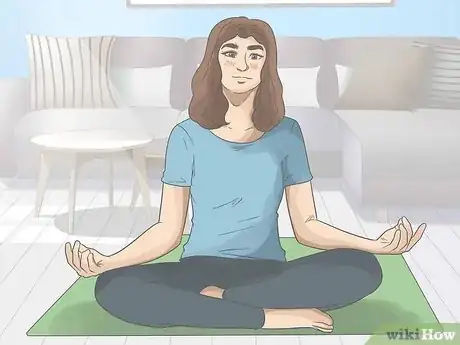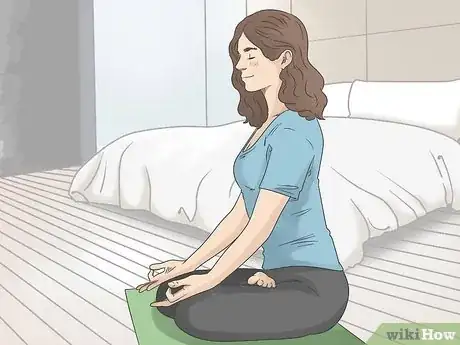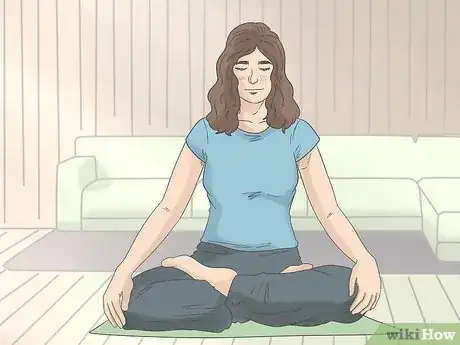This article was co-authored by Alyssa Chang. Alyssa Chang is a nutrition coach and trainer, based in the San Francisco Bay Area. She uses her extensive background in brain-based neuroscience to work with clients on improving their connections with their brain and body to heal, reach goals, and move pain-free. She holds a BS in Kinesiology and Exercise, Nutrition and Wellness from the California State University, East Bay and is certified in Precision Nutrition, Z-health Performance and is certified by the National Council for Strength and Fitness.
There are 8 references cited in this article, which can be found at the bottom of the page.
This article has been viewed 46,394 times.
Becoming Zen doesn’t necessarily mean reaching enlightenment or any specific goal. It’s more a journey and practice in living in the moment and experiencing peacefulness in our daily lives. You can practice Zen by focusing on the current task, keeping a positive attitude, and meditating.[1]
Steps
Practicing Zen Habits in Your Daily Life
-
1Do one thing at a time, do it deliberately and completely. Being Zen involves living in the moment and putting proper focus on our everyday routine. Avoid multitasking when possible.
- For example, when you are pouring water, just focus on pouring water. When you are eating, focus on your meal and experience your food.
- Take time to focus on the task at hand no matter how big or small. This means not looking at your phone while at the dinner table, or trying to multitask during your day. If you are answering an email. Focus only on answering the email before checking your favorite website.
- Put your focus into the task at hand to perform it deliberately, and take your time. Try not to move on to the next task until you complete your current one.
-
2Allow for space in your daily schedule. Try to do less with your day. This doesn’t mean being lazy but instead refers to not filling your day with an unending list of tasks.[2]
- Try to minimize the tasks and chores you need to accomplish every day. While this isn't always easy if you are in school or have a busy job, tackling fewer things in a day helps you to keep a clear mind. Focus on the now, don't obsess on the future.[3]
- Additionally, try to leave free time in your schedule. Don’t schedule appointments or meetings too close together. This only causes you to rush from one thing to the next. A packed schedule often draws your focus elsewhere to what you will have to accomplish later. Rather than what you are accomplishing now.
Advertisement -
3Serve someone else. Try to do at least one thing a day that serves someone else.
- Remember to smile and be kind to others. The act of smiling can actually improve your mood by releasing endorphins.[4]
- Even if you’re a parent or serve someone most days, encourage yourself to notice your actions. Don’t just do it because you feel you have to. Try to actually enjoy the act of helping others.
-
4Make cooking and cleaning a form of meditation. Cooking and cleaning often feel like another thing that needs to get done. But these tasks can actually be daily rituals which help you embrace a more Zen lifestyle.
- Try to approach both cooking and cleaning as a form of meditation. Concentrate on what you are doing and the benefits of these tasks.
- Instead of just throwing ingredients together, actually prepare your food and take the time to enjoy the process of making a meal.
- Likewise, focus on how cleaning is literally a way to cleanse both you and your home. A clean room can alter your mood and help you relax. [5]
- Using these parts of your day as a form of meditation will help you to find meaning in ordinary tasks. [6]
-
5Only live with what is necessary. Living simply doesn’t mean that you have to go and throw out all of your material possessions. But it does mean getting rid of what’s not necessary.
- Take stock of what you own and ask yourself if you need all of it. Do you need all those pairs of shoes, the tablets and TVs, and other gadgets?
- You may find that if you get rid of some of the extra things which are making it easier for you to multitask and not be present, you can experience more joy from the moment.
- What’s essential for each of us varies from person to person. Take note of what you use and do every day, and what is just sitting around or getting in the way.
Changing How you Act and React in Situations
-
1Think before you react. We often let ourselves react without thinking in stressful situations when someone annoys or angers us. If you want to be more Zen, next time you are in a situation where you are upset, take a moment to breathe.
- Oftentimes the first thing out of our mouths is not the best. Therefore, when trying to be more Zen, mull over what you want to say before you say it.
-
2Make negative situations and feelings positive. Try to put a positive spin on everything, even when it seems like that’s not an option.
- If you reflect hard enough, you can usually find a way to turn a bad situation or feeling into a good one.
- Maybe you hate getting up to go to work. This could mean that you need to discover a new path in your life. Perhaps it’s time to start looking for a new job. Take positive action by setting a time and day to update your resume and start networking.
- Don’t ignore your negative thoughts or emotions. Accept that you have these feelings and take a moment to think about how you can counteract these bad feelings or thoughts with good ones.[7]
- If you feel beaten or rejected by something in your life, try to figure out what that is. Then reroute your thinking from “I’m not good enough,” to “This is an opportunity to explore something new.”
-
3Understand your anger. Becoming Zen isn’t just about staying present and being happy. It’s about understanding how our body and mind works, especially together. And using that knowledge to accept who we are, all our faults included. Sit comfortably for a while with your eyes closed and try to picture your anger as if it were tangible.
- What colors or images do you see? Notice anything that might come up which makes you angry. Your subconscious mind could be giving you clues as to what triggers your anger.
- Notice where your body tenses up and where you feel anger. Some people feel a pit in the stomach; others feel a burning in the chest.
- Breathe slowly in through your nose and out through your mouth.
- Jot down all of your angry thoughts and triggers. Write down where you felt your anger. Then, read what you wrote. Begin to form actionable steps on how to turn this anger into positive fuel and energy.
- It will take a while to tackle all of your inner demons. And that’s ok because it’s natural.
-
4Know when it’s time to remove yourself. If you know that you are likely to speak without thinking or begin to feel that anger, fear, frustration, or any other negative emotion build up, it may be time to leave.
- Inaction in certain settings is the path to being Zen. By not acting negatively in a certain moment and leaving, you are choosing to act positively in another moment.
- Politely excuse yourself. Go for a walk outside and take a few minutes to breathe and find something to be grateful for.
-
5Get enough sleep. Negative moods, anxiety, depression, and a short temper are major side-effects of not getting enough sleep.
- Decide to go to bed earlier on weeknights.
- Unplug. Sleeping with the tv on or using your phone before bed affects how well you can fall asleep. The quality of your sleep after you dose off will also suffer. By keeping our eyes and brains stimulated from the blue light, noises, and pictures, we don’t give our brains the proper time to prepare for rest.[8]
Meditating to Become Zen
-
1Sit or kneel in a position that is comfortable to you. There are many positions which you can situate yourself for meditation. However, you will find the best results in one which is comfortable to you. [9]
- The Burmese position has you sitting with your legs crossed and both your feet and knees on the floor.
- The Lotus or Half Lotus positions has you seated with both feet placed on the opposite thigh, or just one in the Half Lotus.
- Seiza posture positions your body so you are on your knees with your buttocks resting on your upturned feet.
- Chair position has you simply upright in a chair.
- For every position, place your hands folded together. One hand holds the other, palms up. Your thumbs are lightly touching. Rest your hands on either your feet or thighs depending on your position.
- Keep your back straight and your head positioned over your heart. Picture a beam extending from the crown of your head into the sky.
-
2Practice your breathing. Feeling your breath is the main focus when meditating.
- Breath in and out through your nose.
- Take steady breaths and notice how your body moves as you breathe. Your diaphragm should extend out as you breathe in to allow for more air.
- Breath through your whole body, taking the breath deep down and into your stomach and back.
-
3Pay attention to where your tension is. As you stay still and focus on your breath, you’ll start to notice which parts of your body carry more tension. It may be your back, neck, or shoulders.
- During Zazen, Zen meditation, you will most likely experience tension. When you do, try to breathe into these areas and relax.
- If you find that your shoulders are tense, notice how you are positioned. Are your shoulders scrunched up? Let your body loosen up as you continue to breathe.
- If it helps, think of the tension blowing off of you with every breath.
-
4Relax your jaw. In Zazen, it’s typical practice to keep your mouth shut. However, oftentimes, this causes people to clench the jaw.
- Keeping your jaw and facial muscles relaxed is a great way to release a lot of tension.
- Rub your jaw in circular motions before meditating to help loosen the muscles.
- Clenching your jaw can often lead to headaches.
- Put a slight smile on your face to keep your facial muscles loose.
-
5Don’t fight your thoughts. In Zazen, it’s common to keep your eyes open slightly and fixated on a certain point. This can sometimes cause you to become distracted. Try not to fight your thoughts.
- If you wish, you can also close your eyes.
- During meditation your mind will begin to wander. Let it. Try not to steer it in any way.
- Focus on your breathing as much as possible. Sometimes it helps to count your breaths from 1 to 10, then starting back at 1. The counting will allow you to stay in the moment of your breathing and not wander.
Expert Q&A
Did you know you can get expert answers for this article?
Unlock expert answers by supporting wikiHow
-
QuestionHow can I be happy?
 Alyssa ChangAlyssa Chang is a nutrition coach and trainer, based in the San Francisco Bay Area. She uses her extensive background in brain-based neuroscience to work with clients on improving their connections with their brain and body to heal, reach goals, and move pain-free. She holds a BS in Kinesiology and Exercise, Nutrition and Wellness from the California State University, East Bay and is certified in Precision Nutrition, Z-health Performance and is certified by the National Council for Strength and Fitness.
Alyssa ChangAlyssa Chang is a nutrition coach and trainer, based in the San Francisco Bay Area. She uses her extensive background in brain-based neuroscience to work with clients on improving their connections with their brain and body to heal, reach goals, and move pain-free. She holds a BS in Kinesiology and Exercise, Nutrition and Wellness from the California State University, East Bay and is certified in Precision Nutrition, Z-health Performance and is certified by the National Council for Strength and Fitness.
Wellness Coach & Personal Trainer
-
QuestionHow can I be more thankful for what I have?
 Alyssa ChangAlyssa Chang is a nutrition coach and trainer, based in the San Francisco Bay Area. She uses her extensive background in brain-based neuroscience to work with clients on improving their connections with their brain and body to heal, reach goals, and move pain-free. She holds a BS in Kinesiology and Exercise, Nutrition and Wellness from the California State University, East Bay and is certified in Precision Nutrition, Z-health Performance and is certified by the National Council for Strength and Fitness.
Alyssa ChangAlyssa Chang is a nutrition coach and trainer, based in the San Francisco Bay Area. She uses her extensive background in brain-based neuroscience to work with clients on improving their connections with their brain and body to heal, reach goals, and move pain-free. She holds a BS in Kinesiology and Exercise, Nutrition and Wellness from the California State University, East Bay and is certified in Precision Nutrition, Z-health Performance and is certified by the National Council for Strength and Fitness.
Wellness Coach & Personal Trainer Start a gratitude recollection practice by reflecting on everything you're truly great for. Try turning it into a story. So don't just say "I'm thankful for my house. I'm thankful for my family," say, "I'm thankful for this house where my family spends our time and we..." This really helps to bring you from the past to the present, which can make you feel more centered.
Start a gratitude recollection practice by reflecting on everything you're truly great for. Try turning it into a story. So don't just say "I'm thankful for my house. I'm thankful for my family," say, "I'm thankful for this house where my family spends our time and we..." This really helps to bring you from the past to the present, which can make you feel more centered. -
QuestionWhy is self-worth important?
 Alyssa ChangAlyssa Chang is a nutrition coach and trainer, based in the San Francisco Bay Area. She uses her extensive background in brain-based neuroscience to work with clients on improving their connections with their brain and body to heal, reach goals, and move pain-free. She holds a BS in Kinesiology and Exercise, Nutrition and Wellness from the California State University, East Bay and is certified in Precision Nutrition, Z-health Performance and is certified by the National Council for Strength and Fitness.
Alyssa ChangAlyssa Chang is a nutrition coach and trainer, based in the San Francisco Bay Area. She uses her extensive background in brain-based neuroscience to work with clients on improving their connections with their brain and body to heal, reach goals, and move pain-free. She holds a BS in Kinesiology and Exercise, Nutrition and Wellness from the California State University, East Bay and is certified in Precision Nutrition, Z-health Performance and is certified by the National Council for Strength and Fitness.
Wellness Coach & Personal Trainer
References
- ↑ http://www.zenki.com/index.php?lang=en&page=Masunaga01
- ↑ Alyssa Chang. Life Coach. Expert Interview. 16 October 2019.
- ↑ Alyssa Chang. Life Coach. Expert Interview. 16 October 2019.
- ↑ http://www.lifehack.org/articles/communication/7-benefits-smiling-and-laughing.html
- ↑ http://zenhabits.net/the-minimalists-guide-to-simple-housework/
- ↑ http://www.wholeliving.com/136279/cleaning-meditation-how-transform-your-chores#25615
- ↑ http://breakingmuscle.com/sports-psychology/how-to-turn-negative-thoughts-into-positive-actions
- ↑ http://www.webmd.com/sleep-disorders/features/power-down-better-sleep
- ↑ https://zmm.mro.org/teachings/meditation-instructions/




















-Step-17.webp)






-Step-9-Version-6.webp)





































